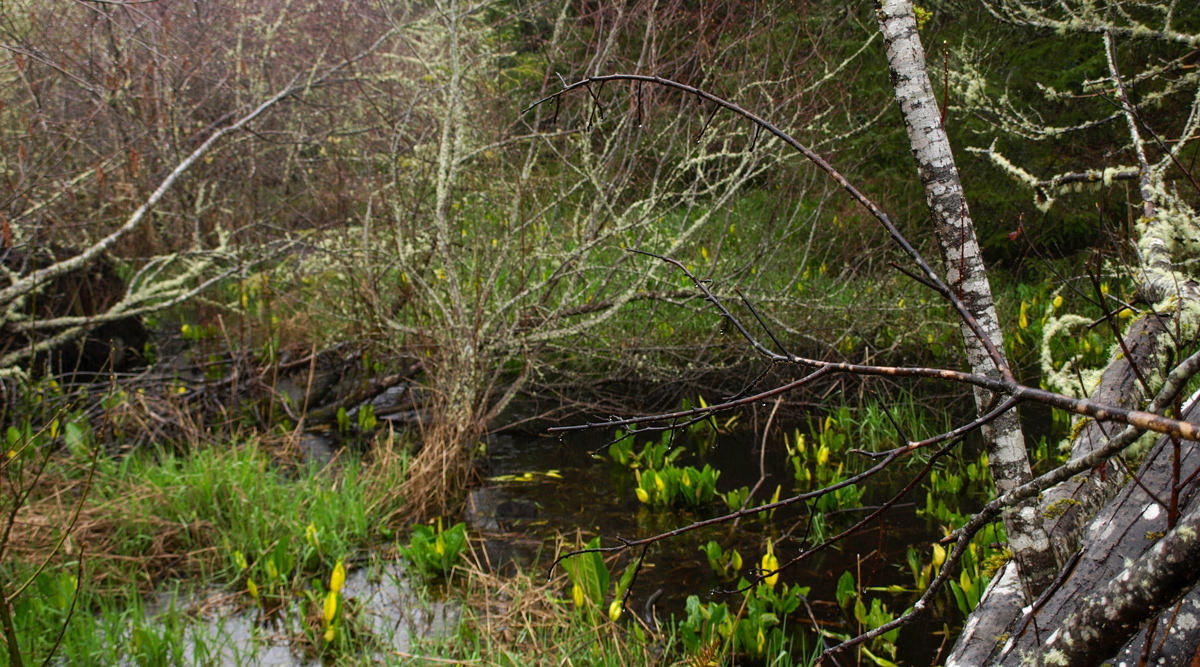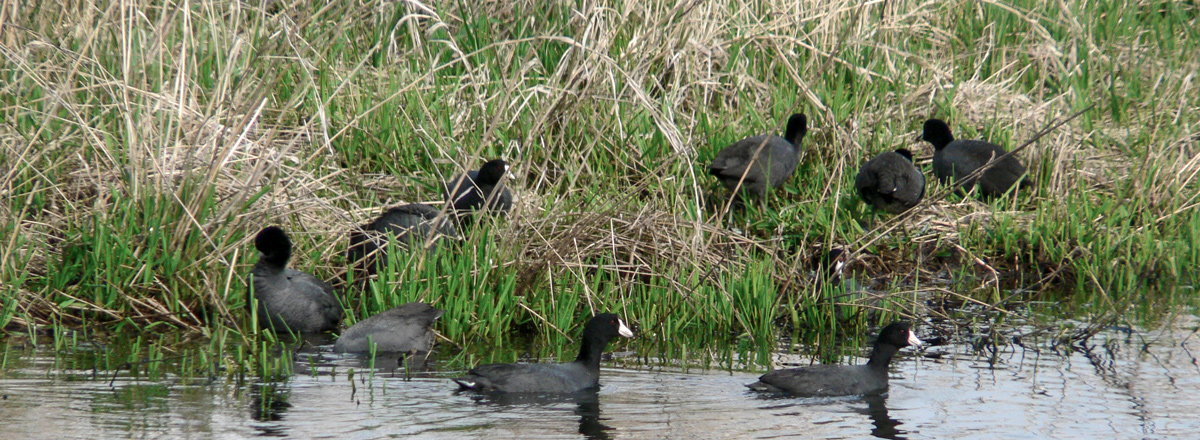Lewis paddles up the Skipanon River and sends his men in all directions. They find plenty of thickets, marshes, and ponds but no place eligible as a winter encampment. Back at Tongue Point, several are ill, and Sacagawea gives some old, sour bread to Clark.
Burial Vaults
by Yellowstone Public Radio[1]Originally aired weekdays by Yellowstone Public Radio during the Bicentennial observance of 2003-2006. Narrated by Hal Hansen. Scripts by Whit Hansen and Ed Jacobson. Produced by Leni Holliman. © … Continue reading
Marshes along the Skipanon River
Fort-to-Sea Trail, 1 April 2009. © by Kristopher K. Townsend. Permission to use granted under the Creative Commons Attribution-Share Alike 4.0 International license.
Up the Skipanon River
Sent out three men to examin the country to the S. & W. they returned after about 2 hours and informed me that the wood was so thick and obstructed by marrasses & lakes that they were unable to proceed to the ocean which could not be at any considerable distance from the apparent sound of the waves breaking on the Coast.
—Meriwether Lewis
Hoping for Clatsop Help
we expect to meet with the Clât-sop [Clatsops] Indians, who have tantilized us with there being much game in their neighbourhood. this information in fact was the cause of my present resurch, for where there is most game is for us the most eliguble winter station.—
—Meriwether Lewis
Several Men Complain
Several men Complain of a looseness and gripeing which I contribute to the diet, pounded fish mixed with Salt water, I derect that in future that the party mix the pounded fish with fresh water—
—William Clark
Sacagawea’s Sour Bread
The Squar gave me a piece of bread made of flour which She had reserved for her child and carefully Kept untill this time, which has unfortunately got wet, and a little Sour— this bread I eate with great Satisfaction, it being the only mouthfull I had tasted for Several months past.
—William Clark
American Coot
Fulica americana
© 2006 Walter Siegmund, Ridgefield National Wildlife Refuge. Permission to use granted under the Creative Commons Attribution-ShareAlike 3.0 Unported license.
The American Coot
The fowlers killed 3 black Ducks with Sharp White beeks keep in large flocks & feed on Grass, they have no Craw and their toes are Seperate, Comon in the U. States
—William Clark
Weather Diary
Day of the month Wind State of the Weather 30th S W. fair after rain & hail rained and hailed with short intervales throughout the last night, Some thunder and lightninge. 3 large Hawks killed, which we thought delicious food
—Meriwether Lewis[2]Some abbreviations have been spelled out.
Tongue Point is a High Potential Historic Site along the Lewis and Clark National Historic Trail managed by the U.S. National Park Service. The site can be viewed from the east at the Lewis and Clark National Wildlife Refuge and to the west along the Astoria Riverwalk.
Notes
| ↑1 | Originally aired weekdays by Yellowstone Public Radio during the Bicentennial observance of 2003-2006. Narrated by Hal Hansen. Scripts by Whit Hansen and Ed Jacobson. Produced by Leni Holliman. © 2003 by Yellowstone Public Radio. |
|---|---|
| ↑2 | Some abbreviations have been spelled out. |
Experience the Lewis and Clark Trail
The Lewis and Clark Trail Experience—our sister site at lewisandclark.travel—connects the world to people and places on the Lewis and Clark Trail.
Discover More
- The Lewis and Clark Expedition: Day by Day by Gary E. Moulton (University of Nebraska Press, 2018). The story in prose, 14 May 1804–23 September 1806.
- The Lewis and Clark Journals: An American Epic of Discovery (abridged) by Gary E. Moulton (University of Nebraska Press, 2003). Selected journal excerpts, 14 May 1804–23 September 1806.
- The Lewis and Clark Journals. by Gary E. Moulton (University of Nebraska Press, 1983–2001). The complete story in 13 volumes.





